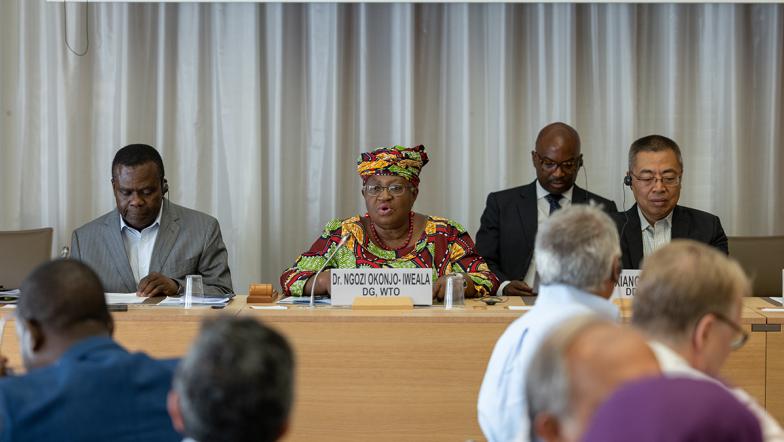DG stresses at Chairs Programme Annual Conference importance of implementing MC12 outcomes

Opening the WTO Chairs Programme (WCP) Annual Conference on 25 July in Geneva, Director-General Ngozi Okonjo-Iweala encouraged participants to share best practices in supporting trade policymaking and to ensure their discussions pave the way for the implementation of the "Geneva Package" adopted at the 12th Ministerial Conference (MC12).
DG Okonjo-Iweala thanked Chairs for their active participation in the WCP through evidence-based research and tailored advice to governments and other stakeholders. This is key to supporting national and regional trade policy formulation and central to the capacity building objectives of the Programme, she emphasized.
The DG said the programme has generated excellent results and the WTO Secretariat will continue to provide all the resources needed to support the Chairs network so the Programme can continue to "deliver results that truly make an impact on those on the ground".
The Director-General stressed the importance of the Chairs aligning their work with the key priorities of WTO members, especially in terms of implementing MC12 outcomes, "bearing in mind how your work can also impact and add value to discussions on issues for which multilateral consensus has yet to be achieved."
She added: "Just getting one successful, though monumental, set of achievements is not enough. A new WTO should now focus on implementing those agreements. We're going to keep moving. On the fisheries agreement, we want to expand the disciplines and strengthen them. On agriculture, we must approach negotiations with new ideas."
The Director-General called on the Chairs to come up with new ideas for tackling unresolved issues. "You are the intellectual powerhouse who can help us to think a little bit out of the box," she said.
Deputy Director-General Xiangchen Zhang echoed the DG's call: "The Chairs have an important role to play in the implementation and dissemination of the outcomes of the 12th Ministerial Conference." He added: "The conference is the perfect opportunity for Chairs and Board members to join forces and share experiences and best practices. They can take full advantage of the collective knowledge that our global chairs network brings to the table, the internal expertise of the WTO Secretariat and first-hand insights of the ambassadors involved in accomplishing the MC12 results."
Representative of WCP donors - France, Austria, the Republic of Korea, and Australia - noted the impact of the Programme in developing and least developed countries and its importance in enhancing these countries' contribution to the multilateral trading system.
From 25 to 27 July, a series of panel discussions and roundtables will take place to discuss various issues, including trade policy and gender equality, and activities undertaken within the three pillars of the WCP - outreach, research and curriculum development. Top of the agenda will be issues in relation to MC12 outcomes, in particular the decisions on the WTO's response to the COVID-19 crisis and the TRIPS waiver, food security, the fisheries agreement, environmental initiatives and agriculture negotiations.
To enhance cooperation with policymakers, the Chairs and Board members will also meet with WTO ambassadors, including those coordinating WTO member groups, such as the Latin American and Caribbean Group (GRULAC), the African, Caribbean, and Pacific countries (ACP) Group, the African Group and the Small, Vulnerable Economies (SVEs) Group, to discuss members' priorities for applied research, customized training and targeted outreach.
On 27 July, a joint session titled "Inclusive, empowering, resilient, and sustainable trade: the contribution and the role of the WCP in fostering these objectives" will be organized by the WCP in collaboration with the Aid for Trade initiative during the Eighth Global Review. The full programme of the Aid for Trade event is available here.
More
The WTO Chairs Programme is fostering research, training and outreach activities of relevance to governmental policy makers and other stakeholders at universities in developing and least developed countries.




